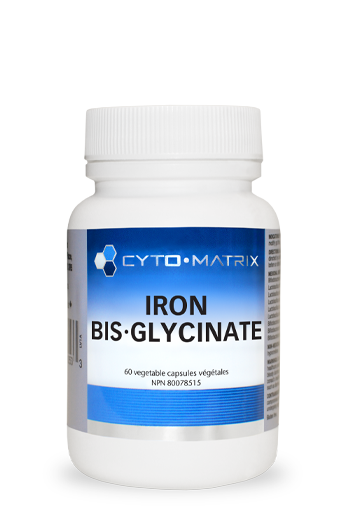Iron Bis·Glycinate – 25mg Full Chelate
- Each vegetable capsule provides 25mg of elemental iron in a bis-glycinate chelate for optimal absorption and digestive tolerability
- Indicated for those with iron-deficient anemia and associated symptoms of fatigue, hair loss, poor cognition, low mood, weakened immunity and hormonal imbalances
Iron continues to be the most common nutrient deficiency in the developed world, with an especially high prevalence in women and during pregnancy. In fact, 1 out of every 2 women will be iron-deficient at one point in their lives and even more suffer from symptoms associated with suboptimal iron levels. Although fatigue, weakness, hair loss and pallor are classic symptoms of iron-deficiency anemia, low iron levels affect many other body systems.
For example, iron deficiency has been found to be a cause of restless syndrome in approximately 1 out of every 4 cases and supplemental iron can improve symptoms. This is thought to be achieved by iron’s upregulation of dopamine synthesis from tyrosine. It is also well-documented that children and adults perform poorer on mental function tests when in states of iron deficiency, with areas such as attention, memory and concentration being affected.
Iron also plays a critical role in many hormonal pathways. Iron is required for thyroid conversion from thyroxine (T4) to triiodothyronine (T3) and iron supplementation may improve the outcomes of levothyroxine therapy in affected patients. In women with heavy menstrual bleeding, iron deficiency can cause a recurring state of heavy menstrual bleeding through weakened uterine muscles, thereby exacerbating the condition. Evidence also shows that women with unexplained infertility and suboptimal iron status may benefit from iron restoration therapy.
Finally, iron is needed for proper immune function through cytokine production in macrophages and an iron-deficient state may lead to an insufficient immune response. For example, research in individuals with oral candidiasis has shown that iron restoration can lower salivary candida counts and reduce oral lesions.
Despite all of the health benefits that come with targeted supplemental iron, many women and iron-deficient individuals are hesitant to supplement with iron or they become non-compliant due to digestive side effects such as constipation, nausea and stomach upset.
Cyto·Matrix’s Iron Bis·glycinate contains iron in the chelated form of iron bis-glycinate for optimal absorption and gentle action on the digestive tract, greatly reducing the likelihood of these unwanted complications of iron supplementation.
Unit of Measure above:
Each capsule
| Ingredient | Amount | |
|---|---|---|
| Iron (Ferrochel™ ferrous bis-glycinate chelate) | 25mg | |
|
Non-Medicinal Ingredients:
Vegetable-grade magnesium stearate, microcrystalline cellulose. Capsule: hypromellose.
Directions for Use: Adults - Take 1 capsule per day with food, or as directed by a healthcare professional. Take a few hours before or after taking other medications.
Cautions: Do not use if safety seal is broken.
Keep out of reach of children. There is enough iron in this package to seriously harm a child.
Known Adverse Reactions: Stop use if hypersensitivity occurs.
Iron continues to be the most common nutrient deficiency in the developed world, with an especially high prevalence in women and during pregnancy. In fact, 1 out of every 2 women will be iron-deficient at one point in their lives and even more suffer from symptoms associated with suboptimal iron levels. Although fatigue, weakness, hair loss and pallor are classic symptoms of iron-deficiency anemia, low iron levels affect many other body systems.
For example, iron deficiency has been found to be a cause of restless syndrome in approximately 1 out of every 4 cases and supplemental iron can improve symptoms. This is thought to be achieved by iron’s upregulation of dopamine synthesis from tyrosine. It is also well-documented that children and adults perform poorer on mental function tests when in states of iron deficiency, with areas such as attention, memory and concentration being affected.
Iron also plays a critical role in many hormonal pathways. Iron is required for thyroid conversion from thyroxine (T4) to triiodothyronine (T3) and iron supplementation may improve the outcomes of levothyroxine therapy in affected patients. In women with heavy menstrual bleeding, iron deficiency can cause a recurring state of heavy menstrual bleeding through weakened uterine muscles, thereby exacerbating the condition. Evidence also shows that women with unexplained infertility and suboptimal iron status may benefit from iron restoration therapy.
Finally, iron is needed for proper immune function through cytokine production in macrophages and an iron-deficient state may lead to an insufficient immune response. For example, research in individuals with oral candidiasis has shown that iron restoration can lower salivary candida counts and reduce oral lesions.
Despite all of the health benefits that come with targeted supplemental iron, many women and iron-deficient individuals are hesitant to supplement with iron or they become non-compliant due to digestive side effects such as constipation, nausea and stomach upset.
Cyto·Matrix’s Iron Bis·glycinate contains iron in the chelated form of iron bis-glycinate for optimal absorption and gentle action on the digestive tract, greatly reducing the likelihood of these unwanted complications of iron supplementation.
Unit of Measure above:
Each capsule
| Ingredient | Amount | |
|---|---|---|
| Iron (Ferrochel™ ferrous bis-glycinate chelate) | 25mg | |
|
Non-Medicinal Ingredients:
Vegetable-grade magnesium stearate, microcrystalline cellulose. Capsule: hypromellose.
Directions for Use: Adults - Take 1 capsule per day with food, or as directed by a healthcare professional. Take a few hours before or after taking other medications.
Cautions: Do not use if safety seal is broken.
Keep out of reach of children. There is enough iron in this package to seriously harm a child.
Known Adverse Reactions: Stop use if hypersensitivity occurs.



